"There can be no such thing that there is no connection. After all, the radio and wireless operators are in order. I know that for a fact!"
The radio station with assigned staff was housed near the division's headquarters building, in a house right across the street.
Together we ran to this house, with horrible thoughts rushing into our heads.
Are those people dead? Killed by Germans? How could that happened next to the corps headquarters? Is there an imminent German attack?
We quickly broke in through the locked entrance door and what did we see?
The radio receiver-transmitter set was turned off, and all radio operators were lying drunk and unconscious on the floor...
There were four privates and a sergeant in charge.
|

"RCB" model of Soviet WWII radio-transmitter set used by Ruvim |
Riga was captured, booty was plundered, and many prisoners were captured, so why not get drunk?
Many of us thought the end of the war was near after Riga was taken.
(They were wrong; in a small part of Latvia, adjacent to the Balic Sea, the remnants of the German Army,
and supporting Latvian and Estonian SS units, continued to resist with varying success over the next 8 months,
until the very end of the war.)
|